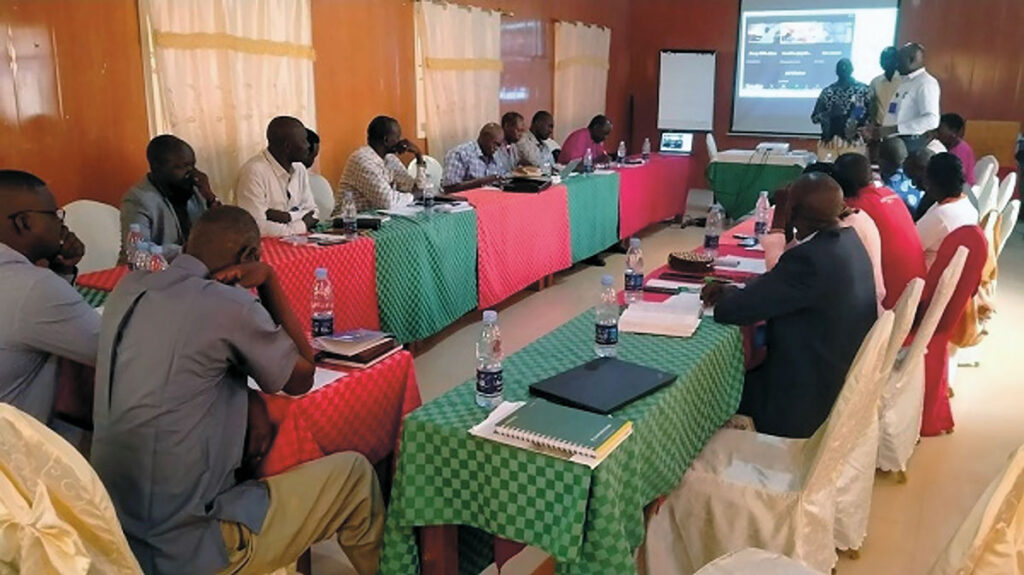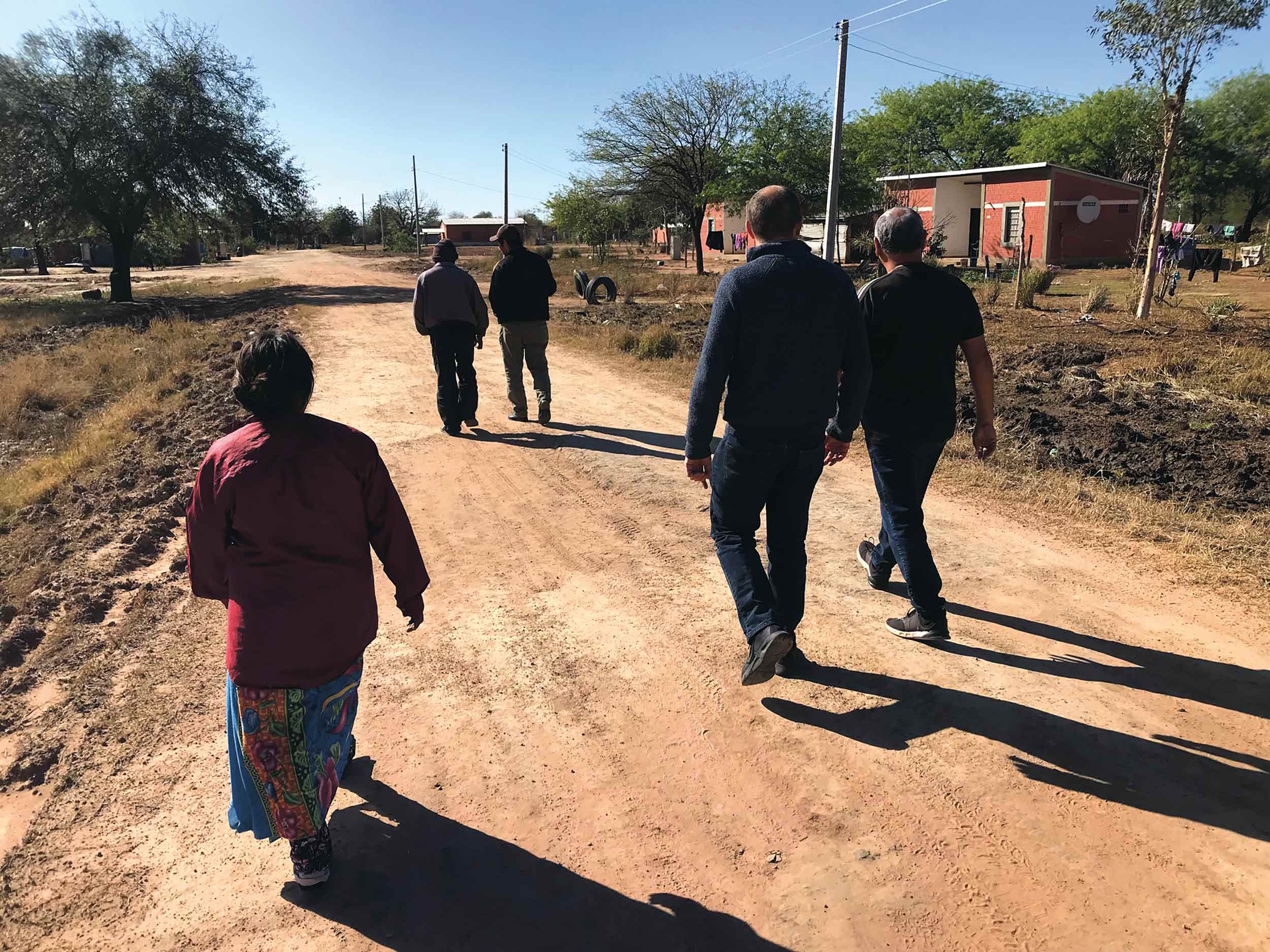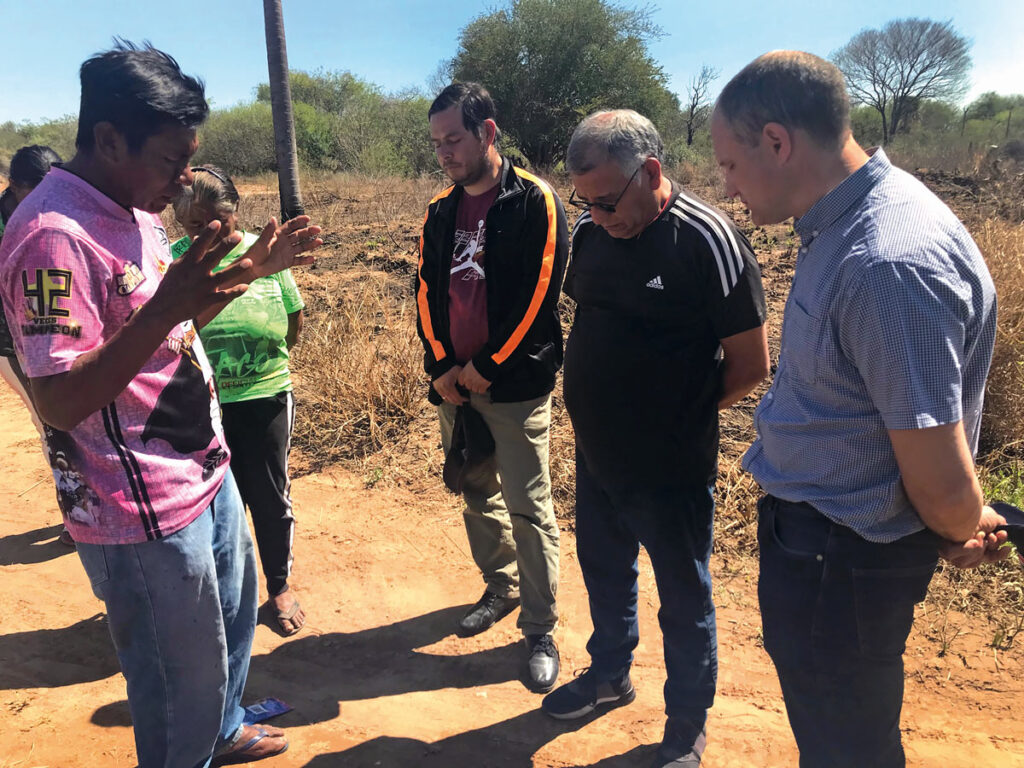A listening year
Church Mission Society has bold mission plans, but we dare not launch them without first listening to Jesus, to each other and to voices from the edges.
Photo: Canon Moses Bushendich of CMS-Africa and Rev Bisoke Balikenga, a CMS local partner, listen to people’s stories in Bunia, DR Congo, where Bisoke helps serve many tens of thousands of displaced people
Consultation. It’s not the most riveting word. Yet in the last year Church Mission Society has been taking part in a series of mission consultations across the world, and according to the people involved, it’s been nothing short of illuminating.
When people think about consultations, conferences or meetings, they might get the impression of “all talk and no action”. But the consultations CMS has been part of have been less about us talking and much more about us listening.
Listening in mission
The virtues of listening have long been extolled in most areas of our lives. When it comes to mission, one could argue that there hasn’t been enough of it, historically or presently. The challenges of listening in mission include:
- It takes time – people in mission are often activists, tempted to always be doing.
- It involves letting go of control – resisting the urge to guide the discussion can be hard for some of us.
- It can be risky – we might end up hearing things that make us uncomfortable, or cause us to change our plans.
There’s much more that could be said, but what it basically comes down to is that listening requires humility. Former general secretary of CMS John V Taylor describes this posture as: “I shall come as a stranger with everything to learn again.” In this he echoed the words of Paul to the Corinthians: “For I decided to know nothing among you except Jesus Christ, and him crucified. And I came to you in weakness and in fear and in much trembling” (1 Corinthians 2:2–3).
Listening in Africa, for peace
What does this look like in practice? The first mission consultation CMS took part in, together with CMS-Africa, was about a year ago in DR Congo. The topic was “making disciples in a context of conflict” – a key focus for both organisations in the coming years.

Despite the logistical challenges of connecting more than 100 people from several dioceses online with translation into multiple languages, the general consensus is that it was good to bring people together around this pressing issue. It was a meaningful time of listening and learning. Staff from CMS and CMS-Africa reflected: “The discussions were enriching and enlightening, as we got a glimpse of what the church and Christians have been doing in seeking peace and reconciliation in the eastern parts of the country….” There was lively and thought-provoking conversation and, “the Congolese participants were enthusiastic about what they are going to continue doing in growing peace… and making disciples for Christ. We thank God.”
Do you hear what I hear?
A further consultation was held in May in Wau, South Sudan, another area where conflict and violence are a major concern. CMS manager in Africa Joan Busolo commented on the dynamics she observed: “At the outset, it looked happy, very friendly with jokes here and there. When we settled to the discussion looking at the biggest challenges and the most appropriate intervention in making disciples in this edge [context], I could hear discomfort and uneasiness….”

“I shall come as a stranger with everything to learn again.” – John V Taylor
Joan said she soon realised that some women felt uncomfortable speaking up due to cultural gender expectations, so it became important to make sure their voices were heard. “Culture is pushing women into silence. We encouraged gender-based groups in the next session and the women contributed greatly to the discussion [about how to work for peace].
“When I listen, I understand better and communicate better,” Joan reflected. “I hear the silence, the unsaid words, the emotions and this is crucial to my partnerships….”
Listening in Latin America, the Middle East and Britain
At the time of writing, CMS has been looking forward to another time of listening in Latin America in October: an Indigenous Mission Congress in Argentina. “This will be a chance for indigenous peoples (with whom CMS has strong connections) from Argentina, Chile and Paraguay to participate in a dialogue with CMS, a few strategic partners and specifically with each other about the issues and challenges they face and what they want to see done about them,” said Paul Tester, regional manager in Latin America.
And the listening in Latin America didn’t start with the conference – over recent months Paul and others have been travelling to different communities for grassroots “pre-consultations” to ensure that the widest possible range of voices are heard. More formal research interviews and group meetings have also been held to explore issues facing the communities – and these visits and research have shaped the topics being discussed at the congress.

Active listening is also happening more informally. In the Middle East, regional manager Tanas Alqassis has been speaking and listening with local partners about how best to strengthen people’s faith in places where Christians are a minority. “Building trust takes time, we need to listen without trying to mould others’ concerns into our aims. Things like having a meal or coffee together with no agenda helps people be more open. We need to listen in order to learn.”
Jonny Baker, who started the Pioneer Mission Course at CMS, wants to join in God’s mission in the UK, where 85 per cent of people will likely never enter a church. He and his team are embarking on a year of listening: “Basically we are trying to listen to God’s Spirit, listen to the world, listen to one another and listen to those at the edges.
“Seeing what God is doing is foundational, so discernment or listening is always the start point. It’s listening to God. It’s listening to context. It’s listening to the wisdom of others so you can learn from their mistakes and good practice.”
Good posture
Andy Roberts, director of mission, agrees: “If you believe that God is already at work in a context, then you need to be listening to those who best know the context…. Learn from them the best way things can be done and what the local missional needs are. Posture is also important – are we humble enough to realise that we shouldn’t be taking the lead in every situation? Working alongside and under local leadership might be the most effective way of doing mission.”